We have chosen to support Kyiv School of Economics Charitable Foundation (KSE CF).
We have chosen to support Kyiv School of Economics Charitable Foundation (KSE CF).
The Kyiv School of Economics Charitable Foundation (KSE CF) was established in 2007 as a subsidiary of its non-profit corporation in the United States. Originally, focused on providing scholarships for its students.
Working directly with the Government of Ukraine, other funds, and multiple volunteer organizations, KSE CF has established itself as one of the largest humanitarian aid foundations providing vital medicines and food, to those in Ukraine.
Kyiv School of Economics is a 501 (c) (3) non-profit corporation registered in Washington DC, EIN 52-2264611.

The Kyiv School of Economics Charitable Foundation (KSE CF) was established in 2007 as a subsidiary of its non-profit corporation in the United States. Originally, focused on providing scholarships for its students.
Working directly with the Government of Ukraine, other funds, and multiple volunteer organizations, KSE CF has established itself as one of the largest humanitarian aid foundations providing vital medicines and food, to those in Ukraine.
Kyiv School of Economics is a 501 (c) (3) non-profit corporation registered in Washington DC, EIN 52-2264611.
KSE President, Associate Professor of the University of Pittsburgh, former minister of Economic Development, Trade and Agriculture of Ukraine
“From the first days of the war, we quickly adapted to the changes and created a new ecosystem capable of meeting the challenges of the time and saving thousands of Ukrainians. In 2 months, KSE Foundation has established itself as one of the largest humanitarian funds, providing life-saving medicines and protective kits to our citizens.
Our strength lies in the knowledge, skills and networking that allow us to change the world, help Ukrainians and get closer to victory every day.”
Tymofiy Mylovanov,
President of KSE Group
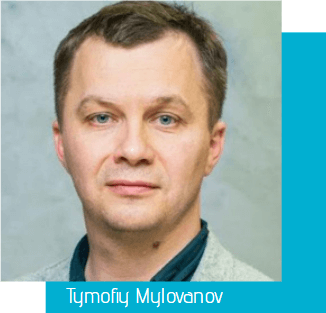
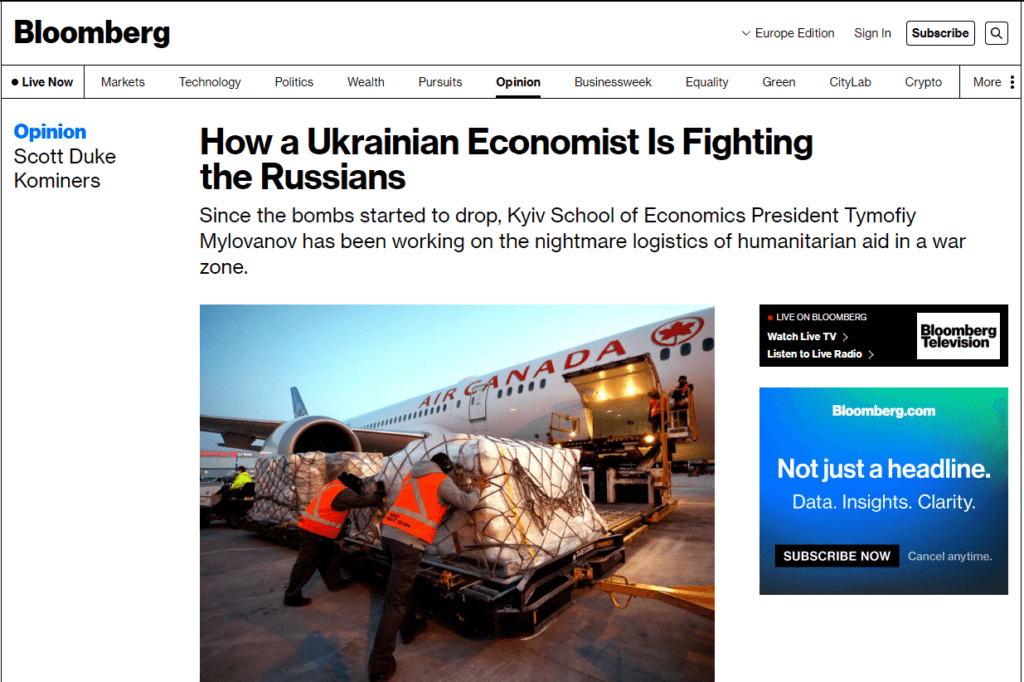
Since the bombs started to drop, Kyiv School of Economics President Tymofiy Mylovanov has been working on the nightmare logistics of humanitarian aid in a war zone.
“Most people die from blood loss after a cluster bomb or after some kind of ballistic missile falls. There may be 20 or 200 people wounded. It’s a little bit like when an airplane cabin loses pressure, the masks fall down — and what you need to do is to put the mask on yourself and then help others. So in this case, the mask analogy is a medical kit, which allows you to stop bleeding. So you really have to ensure that you are not bleeding, and then that people next to you are not bleeding.
So you have to have a lot of these medical kits, and they usually cost 10 or 20 bucks. But now of course they cost 100 bucks because it’s surge pricing and no one can deliver. So we are trying to focus on this specifically. Civilian authorities need them and even railroads are asking for these medical kits because evacuation trains get shelled and people die without this specific kit. We will deliver them. We have connections, there’ll be no [extra overhead charges]. It doesn’t get stolen on the way. And [your donation] is also tax deductible in the U.S. So for $100, you’ll save a life and get your taxes back.”
Since the bombs started to drop, Kyiv School of Economics President Tymofiy Mylovanov has been working on the nightmare logistics of humanitarian aid in a war zone.
“Most people die from blood loss after a cluster bomb or after some kind of ballistic missile falls. There may be 20 or 200 people wounded. It’s a little bit like when an airplane cabin loses pressure, the masks fall down — and what you need to do is to put the mask on yourself and then help others. So in this case, the mask analogy is a medical kit, which allows you to stop bleeding. So you really have to ensure that you are not bleeding, and then that people next to you are not bleeding.
So you have to have a lot of these medical kits, and they usually cost 10 or 20 bucks. But now of course they cost 100 bucks because it’s surge pricing and no one can deliver. So we are trying to focus on this specifically. Civilian authorities need them and even railroads are asking for these medical kits because evacuation trains get shelled and people die without this specific kit. We will deliver them. We have connections, there’ll be no [extra overhead charges]. It doesn’t get stolen on the way. And [your donation] is also tax deductible in the U.S. So for $100, you’ll save a life and get your taxes back.”
We are raising money to make a difference by coming together as the strong community we are – not to just be seen to be doing good, but actually do good!
At this point in time, aid is needed now.
Doing any expected/standard fund raising activity takes time, money and effort and we have none of those things – we are not a charity ourselves – we all have day jobs and are juggling busy lives but with this desire to do good.
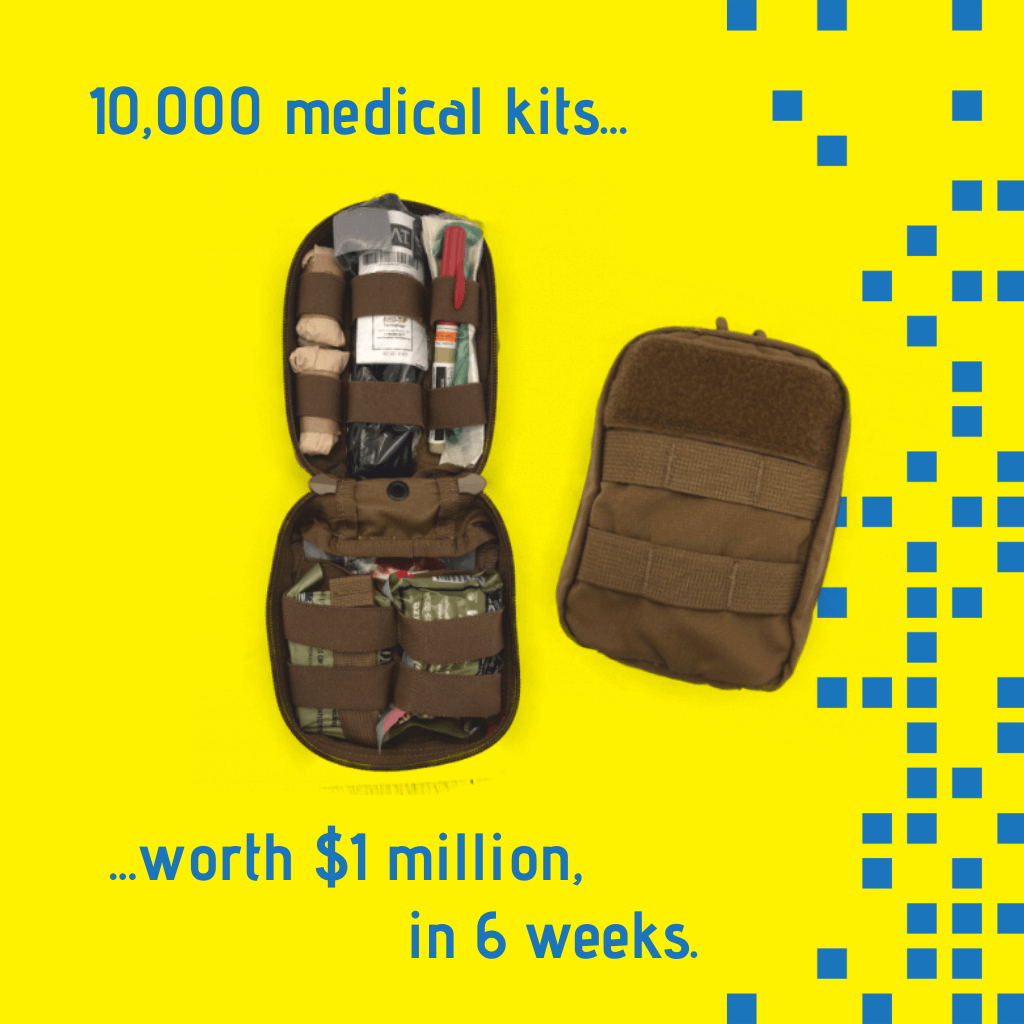
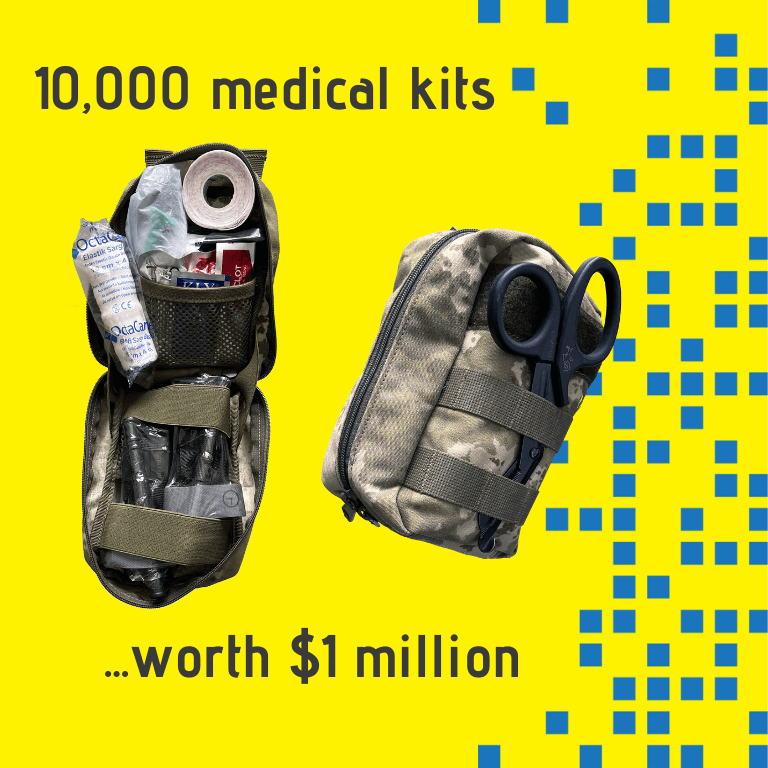
It has become evident that the main danger for civilians at war in Ukraine is death from blood loss caused by shrapnel wounds after the shelling.
* the cost includes the price of the first aid kit from the supplier, transportation costs to Ukraine, unexpected expenses incl. customs, price fluctuations
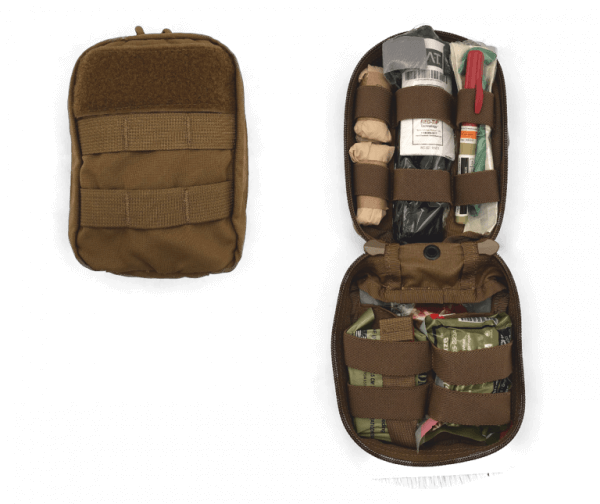
Janet Lilley, HCPC Registered Paramedic, unpacks and explains each element within the kit.
How to help
About D.A.T.A.